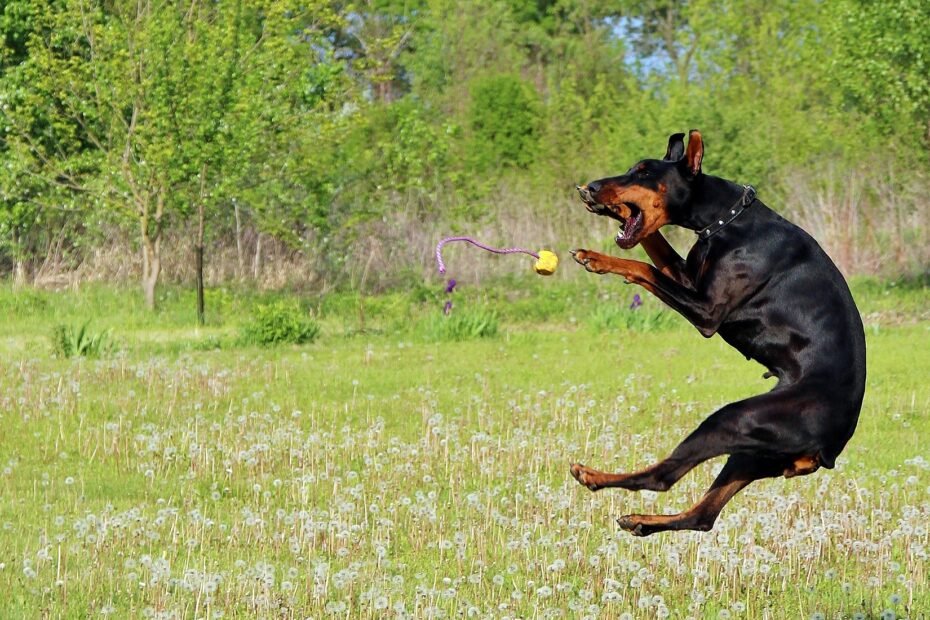If your dog jumps when excited, the short video below a simple yet effective solution for calming down a jumping dog.
Click Here To Visit The Official Online Dog Trainer Website
In the early days, it can be pretty cute if your dog jumps when excited.
Surely it means that they are happy and just generally basking in their love of life and their owner?
Sorry for breaking the bad news but unfortunately this is not usually the case.
Jumping can be indicative of a number of unwanted characteristics, and even the most patient owner will quickly be worn down by the endless overexcitement.
This behavior can manifest itself in many ways. So it’s important to try and break the habit as early as possible to ensure both you and your pooch have a happy life together.
But in order to do so successfully, you first need to understand why your dog jumps and revisit some of the essential basic training techniques.
Why Do Dogs Jump When Excited?
There are a number of reasons why some dogs tend to jump when they become excited.
Remember that this behavior can present itself across all breeds and ages.
So figuring out what makes your dog susceptible is the first step towards preventative training.
Chances are that it will be a combination of the following reasons…
Greeting
First of all, let’s try and understand why dogs jump from our canine buddy’s perspective.
Chances are that you’ll have noticed how your dog interacts and greets other members of their species.
They’ll bump heads gently, have a good sniff of each other’s face and necks and maybe share a quick lick or two.
That’s an example of two sociable dogs happy to share a doggy handshake.
Unfortunately, a good proportion of dogs – and it tends to be slightly more common in larger breeds – attempt to do the same with humans.
Your dog wants to look you in the eye and must jump up in order to do so.
Inevitably, this can lead to muddy footprints all over your clothes and also be quite unnerving to guests who are nervous around dogs.
Another consideration is that some dogs become overreliant on jumping as a means of communicating with us.
Just like humans, some dogs are better at relaying their emotions, needs and wants than others.
Jumping is an easy way to gain attention. But establishing exactly why is the tricky part!
Almost anything can trigger a calm dog into a ball of overexcited leaping chaos, and it can often be indicative of a deeper issue.
Related: 5 Step-By-Step Calming Exercises To Quickly Eliminate Your Dogs Annoying Jumping Habit
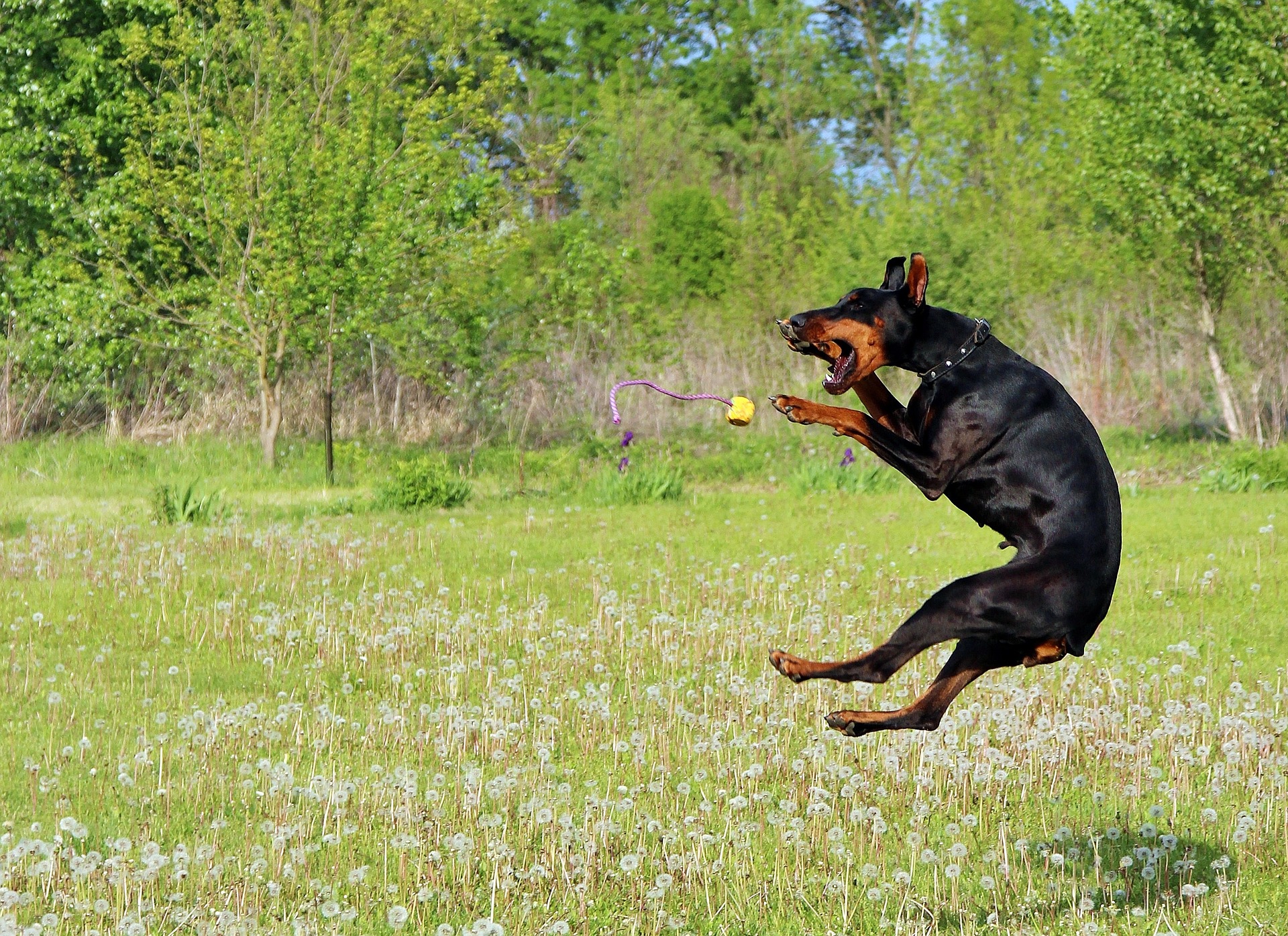
Communication
Does your dog start jumping about when it sees you start opening a can of food?
Perhaps it could be getting the leash ready for a walk.
Or even in those suffering from separation anxiety putting your house keys in your pocket.
These three examples (there are many more potential triggers) demonstrate how needs (food), excitement (walkies), and anxiety (abandonment) can become confused and end up bundled into the same jumping reaction.
So it is our job as responsible owners is to untangle this confusion and train our buddy that it’s OK to be excited but not cool to jump around uncontrollably.
Domination
Hierarchy is extremely important to dogs.
So it’s essential that you maintain your status as the pack Alpha in order to have a mutually beneficial relationship together.
Sure, you control the food supply and provide fun and comforts.
But for some dogs, especially those rehomed from packs (greyhounds are very prone to this), there is a strong chance that they’ll try and become bossy.
While it is unlikely they will ever become aggressive, jumping provides a way for them to attempt to exert a height authority over you.
Needless to say, if this explains why they are jumping up so frequently then it is an issue that must be addressed right away.
Fear
Perhaps the most commonly reported way that jumping becomes a problem is when a normally placid dog suddenly becomes hyperactive when encountering the unexpected.
Jumping around is a natural reaction for many dogs when they meet a stranger.
After all, from their angle, they have no idea who this person is or whether they are friend or foe.
All of a sudden, their priority is to look this stranger in the eye and figure out their business and what they are doing stepping on their turf!
They’ll jump at you too, making sure that you are aware of the ‘threat’ and are taking appropriate action.
In a nutshell, this style of jumping is a stress reaction and can be a clearcut sign of a dog suffering from nervous anxiety.
Related: 5 Step-By-Step Calming Exercises To Quickly Eliminate Your Dogs Annoying Jumping Habit
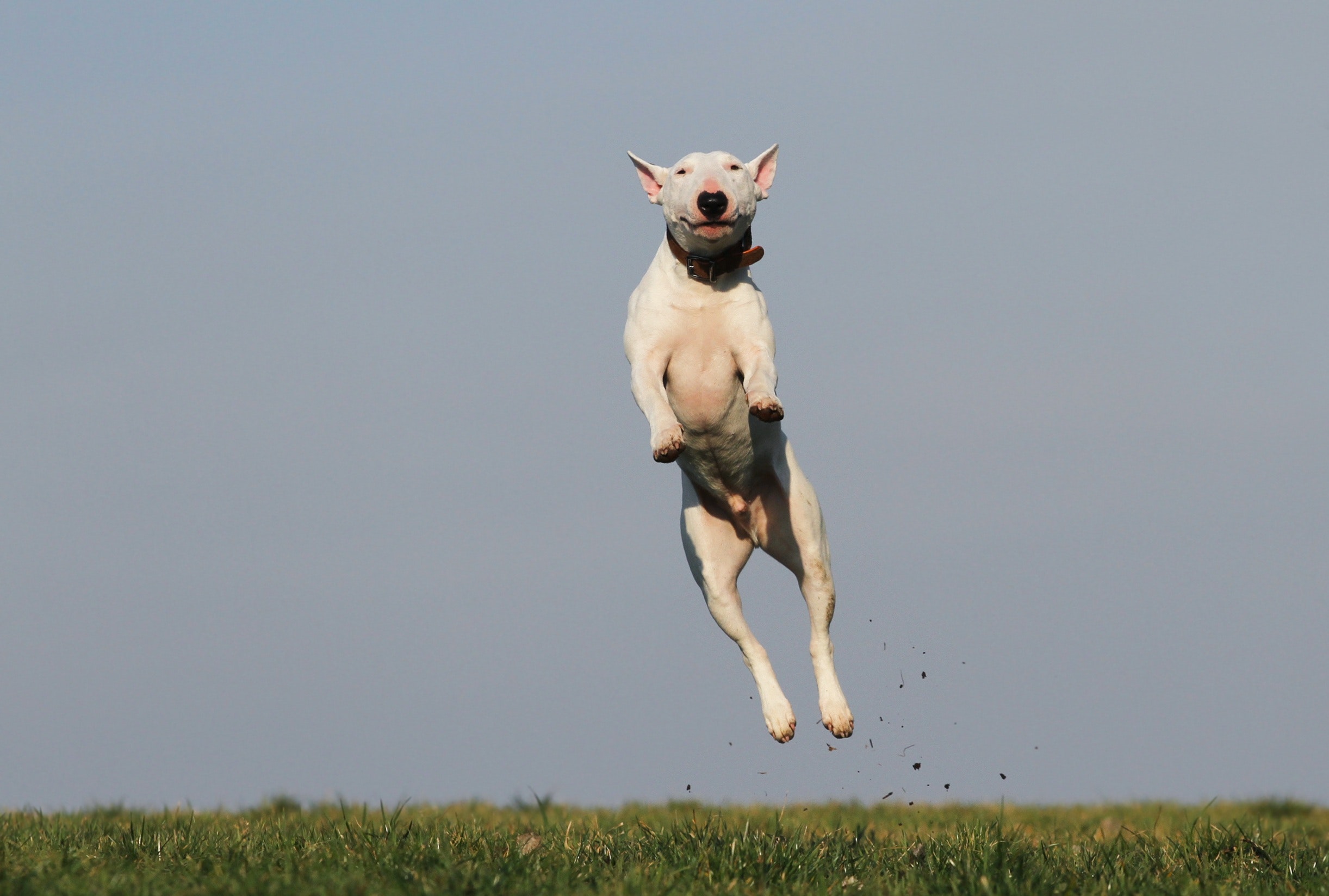
Teaching Your Dog To Be Calm Is The First Step
So how do we start encouraging dogs not to jump up?
The objective is to train the dog to still take an interest in their environment but to react in a far more placid manner.
As with almost all aspects of effective dog training, the place to start is by correcting our own response and behavior and never forgetting that the dog will follow our lead.
Providing we maintain consistency and remember to reward good behavior (positive reinforcement) we’re already two-thirds of the way there.
All that remains is to put it into practice.
So the first step is to lead by example.
Let’s say you are expecting company and the doorbell rings.
Chances are your dog will start bouncing around right away.
Tempting as it is to try and hush them by providing a reassuring pat or two, instead just ignore the dog and behave entirely calmly.
The absolute worst thing possible is to provide any attention (positive or negative) towards an overexcited dog because they will interpret this as an acknowledgment of their behavior.
That is exactly what they want, and frankly, they couldn’t care less if it’s good or bad.
All they’ll understand is that by jumping around they have earned your attention so it’s a successful method which they’ll use again and again in the future.
Such a scenario is often termed negative reinforcement by a professional trainer.
But how do you ignore a dog that is jumping at you?
Well, it depends on the size.
At best, try and just continue ignoring them – easy enough in small dogs.
But for larger breeds, just gently palm them down without making any eye contact or making any noise whatsoever.
The point is to address the situation from an absolute position of calm and by expressing zero interest in your dog’s manic jumping around.
Whatever the situation that causes your dog to become overexcited, every time they express such behavior, just continue to ignore them without exception.
Ensure that everyone in the household understands this and sticks to it.
Even the most energetic and stressed out dog is going to eventually give up and settle down.
Once they have done for a satisfactory amount of time, are calm and at rest, then you can give them some attention and treats.
It may take a little while for this to sink in (depending on the dog), but sooner rather than later it’ll click that “Hey, if I just chill out instead of going bananas, I’ll get some love and treats – how easy!”.
In the vast majority of cases, this tried and tested method will work to effectively calm a dog who exhibits unwanted jumping behavior.
Just remember that old habits can die hard and that there may be instances down the line where they revert to their old bad behavior.
If this happens, just go back to basics and reinforce the rules again.
As time passes it will become increasingly infrequent and hopefully entirely disappear.
Related: 5 Step-By-Step Calming Exercises To Quickly Eliminate Your Dogs Annoying Jumping Habit
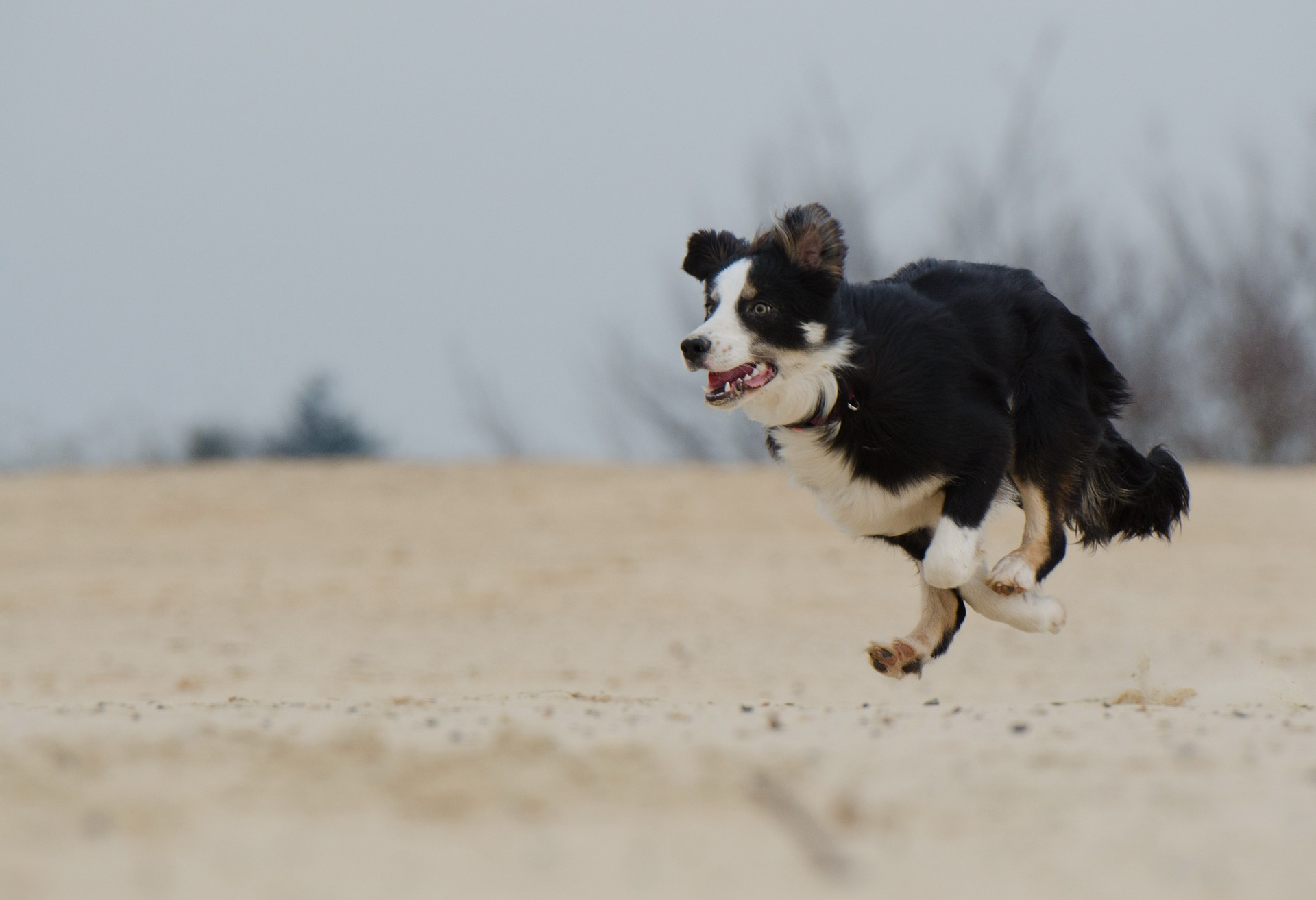
What To Do If Your Dog Jumps When Excited
Encouraging your dog to be generally calm lays the foundation for further training which can have a knock-on effect for assisting with further training.
But when it comes to jumping there are other easily implemented activities which can serve to potentially speed up their understanding that jumping = zero rewards.
Some of these involve training but the biggest change may be to your dog’s daily routine.
So approach the following two suggestions with an open mind and evaluate them according to your own circumstances.
Provide Outlets With Limitations
Dogs do not understand the difference between levels of excitement.
If they are enjoying something and keep being encouraged to the level that they hit a near frenzy (including jumping) then they are going to carry that over into their general behavior.
While it is very important to allow an outlet for your dog to spend their excess energy, you have to manage their playtime very carefully.
In order to do this, you need to set a structure to exercise sessions and also be willing to cut them short at the first sign that your dog is becoming overexcited.
For example, if you have a dog who enjoys playing fetch then be sure to keep an eye on their approach when they return their ball/stick to you.
They ought to place it carefully by your side or directly in your hand with four feet on the ground.
Chances are that after a few dozen throws, your dog will become so excited that they’ll start jumping in anticipation of the next throw.
Or even worse, start jumping at you with the object in their mouth.
When this happens you have two choices…
- Ignore them and wait for them to settle down by your side. Hold that for two minutes and then continue playtime.
- End the session and take your dog back indoors.
It is your call and depends considerably on the level of over-excitement that your dog is displaying.
But whichever option you choose, the idea is to again communicate that when your dog plays ‘nice’ he gets rewards and more exercise.
But when they start jumping then that privilege will be taken away.
There is a fine line between enforcing this rule and making it seem like punishment, which is why you must remember to never scold your dog or exhibit threatening/angry body language.
Related: 5 Step-By-Step Calming Exercises To Quickly Eliminate Your Dogs Annoying Jumping Habit
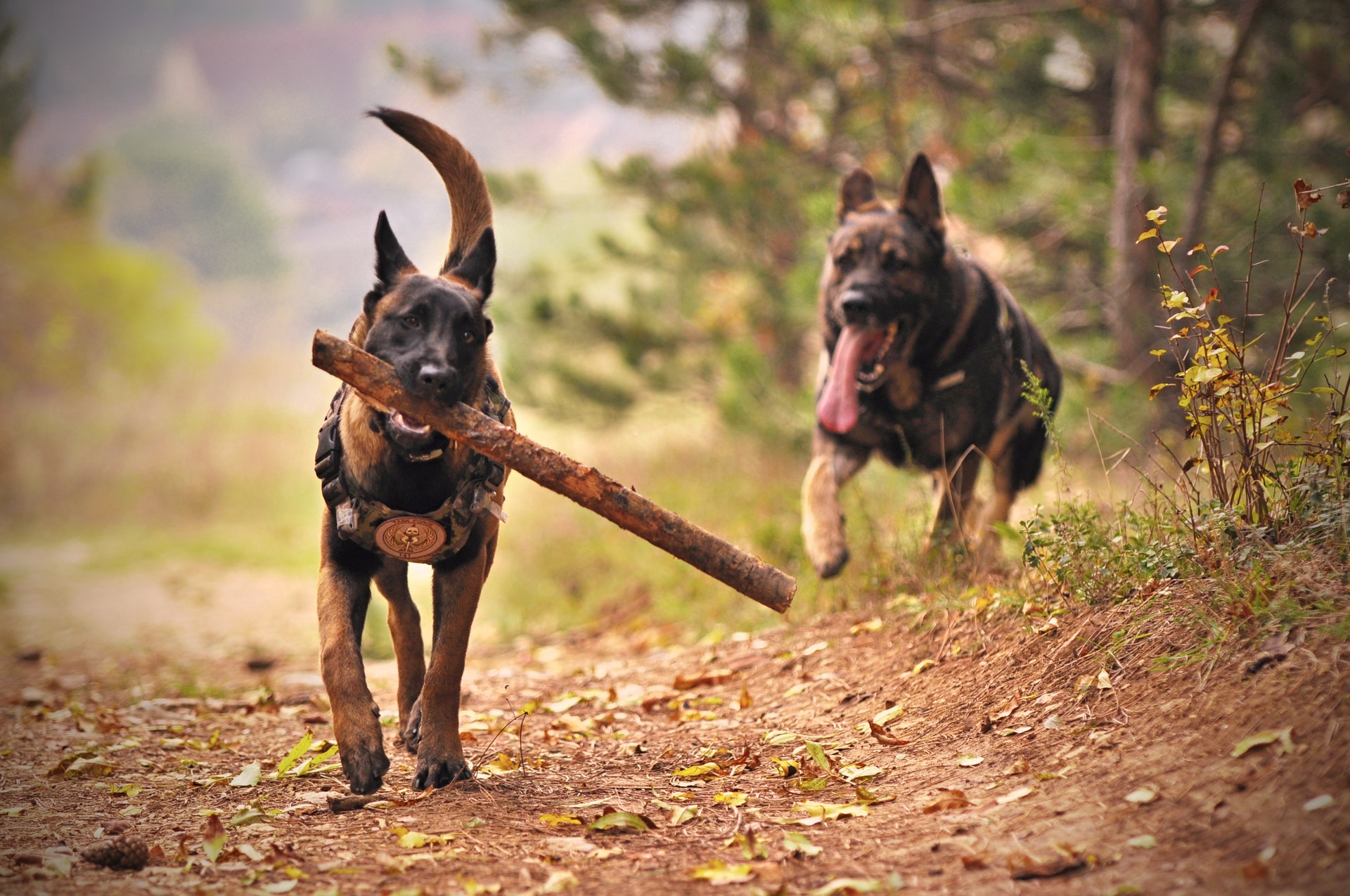
Effective Walking
Many owners make the mistake of assuming that a dog allowed hours to roam around the yard counts as effective exercise.
It does not.
The truth is, that just allowing your dog to amble around the yard is more likely to make them overexcited.
Those distant smells, sounds and maybe even sights can serve to trigger their overexcitability and make the problem worse.
For this reason, it is important to go back to basics and remember what the point of regular walking is.
Remember, it isn’t just to tire Fido out.
Walking is supposed to resemble the motions of a pack.
It could just be patrolling their territory, or it could be a search for food and/or shelter.
Either way, the point is to have an objective at the end of it.
Dogs left to their own devices would not exercise just for the sake of it!
So plan your walks with an ‘end’ whereby your dog is rewarded for good behavior with a combination of snacks and playtime.
Walking to an open space to play fetch is a golden example.
Then, once tired out and hopefully enjoying a satisfied buzz, return home and you’ll have a pooch ready to rest.
Simple as it might sound, providing focus on your dog’s effective exercise can go a long way towards making them calmer.
It is no coincidence whatsoever that calm and well-behaved dogs also happen to be those who have a routine that plays towards their natural instincts.
While this may not in its own right be a cure for dogs jumping, incorporating this into your schedule will foster many positive traits that will make all aspects of training far easier.
Final Thoughts
Establishing and enforcing effective limits on what is acceptable behavior is the key to eliminating jumping tendencies.
Dogs are smart and they will quickly understand that when they decide to play up with attention seeking jumping, all of a sudden their rewards and treats dry up too.
There is no need to scold or punish your dog for exhibiting this trait, and doing so will be utterly counterproductive and most probably make the situation far worse.
But this simple principle alongside effective and proactive schedule that stimulates your dog in the right ways is essential to limiting and eventually expelling jumping tendencies.
Remember that as your dog ages their requirements for exercise are going to change.
It is important to make sure that they receive just enough – ideally two or three times a day – to keep their senses stimulated yet under your control.
The more supervised exposure they have to the world, the less likely they are going to go amok when something exciting (like a guest visiting) happens at home.
To put it simply, they will get used to it and become aware that if they do go crazy then they won’t be getting any treats for a while.
So, what are your experiences with training your pooch to not jump up when excited? Feel free to add any of your own tips in the comments below…
Related: 5 Step-By-Step Calming Exercises To Quickly Eliminate Your Dogs Annoying Jumping Habit
